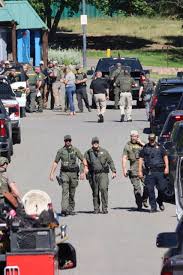Suspect, who started a wildfire, identified in firefighter ambush that killed 2 in US’ Idaho

A shocking ambush in Coeur d’Alene, Idaho, has left two experienced firefighters dead and a third critically injured. The attack happened on June 29, 2025, during a routine wildfire response that turned into a deadly trap.
Wildfire Used to Lure First Responders
Authorities identified the shooter as 20-year-old Wess Roley, a transient man with past ties to California and Arizona. Investigators say Roley intentionally started a brush fire using a flint, then waited in hiding to ambush firefighters.
Shortly after 2 p.m., emergency teams responded to a blaze near Nettleton Gulch on Canfield Mountain. While they prepared to contain the flames, Roley opened fire. The sudden gunfire left the responders with no chance to react.
Two Firefighting Veterans Killed
The victims include two respected battalion chiefs:
- Frank Harwood (42) from Kootenai County Fire & Rescue
- John Morrison (52) from the Coeur d’Alene Fire Department
Both had served their communities for more than 20 years. Their dedication and leadership had earned them wide admiration.
David Tysdal, a 47-year-old firefighter, survived the attack but suffered critical injuries. Doctors performed emergency surgery, and his condition has now stabilized.
Governor Brad Little responded swiftly, ordering flags flown at half-staff statewide. He described the attack as “one of the darkest moments in Idaho’s firefighting history.”
Massive Manhunt Follows the Shooting
Law enforcement quickly launched a large-scale search operation. Over 300 officers from various agencies, including SWAT units and helicopters, scoured the area. Authorities urged nearby residents to shelter in place.
By 7:40 p.m., officers found Roley’s body in the woods. A shotgun lay beside him. Officials believe he died from a self-inflicted gunshot wound.
Sheriff Bob Norris confirmed that Roley acted alone. He reassured the public that no further threat remained.
The Community Grieves
Residents in Coeur d’Alene gathered to mourn the fallen. Vigils began forming within hours of the news. People brought flowers, letters, and flags to local fire stations.
“These men didn’t just serve—they led, protected, and inspired us,” said Amanda Reeves, a local teacher. “We’ve lost part of our soul.”
Though the fire burned nearly 26 acres, crews managed to contain it before it reached homes. Yet the emotional damage runs much deeper.
Investigation Continues into Shooter’s Motive
While the immediate danger has passed, many questions remain. Investigators are analyzing Roley’s phone and social media accounts. They hope to uncover a motive.
Although Roley had no major criminal record, he had faced welfare and trespassing checks. Recently, he had been living in his car. Some believe he struggled with mental health issues, but no official confirmation has been given.
So far, authorities have not found a note or message explaining his actions. His reasons remain a mystery.
Calls for Better Protection of First Responders
This attack has raised serious concerns about firefighter safety. Traditionally, wildland fires involve physical risks—but not violent threats.
Fire departments across the country are reviewing their procedures. Some may add law enforcement escorts or adopt new threat assessment tools.
“This event forces us to rethink safety protocols,” said Chief Michael Benson from a neighboring district. “Responders must know what dangers they face—not just from flames, but from people too.”
Remembering the Fallen
Harwood and Morrison died doing what they loved—protecting others. Their colleagues now carry that legacy forward, even as they grieve.
As one fire department official stated, “They rushed in, as always. And they paid the ultimate price.”
Their names will now be added to memorials and their stories told for years to come.
Conclusion
This tragedy has shaken Idaho and sent a somber reminder to the nation: even heroes face ambushes. The bravery of Harwood, Morrison, and Tysdal deserves more than sorrow—it demands reflection and change.






